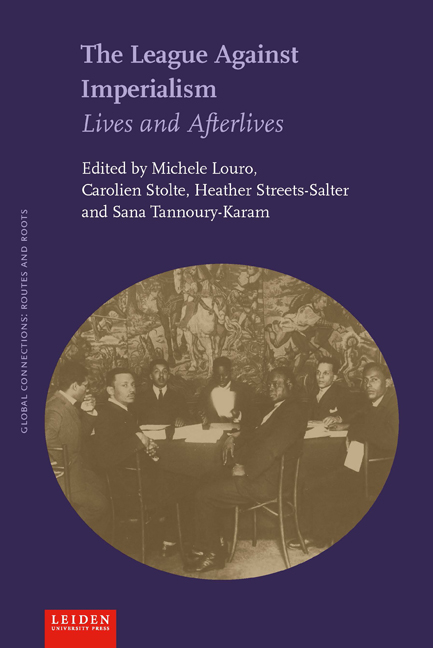Book contents
- Frontmatter
- Dedication
- Contents
- List of Illustrations
- Foreword: Plotting the Anti-Colonial Transnational
- 1 The League Against Imperialism: Lives and Afterlives
- 2 Forging a Proto-Third World? Latin America and the League Against Imperialism
- 3 An Independent Path: Algerian Nationalists and the League Against Imperialism
- 4 “Long Live the Revolutionary Alliance Against Imperialism”: Interwar Anti-Imperialism and the Arab Levant
- 5 China, Anti-imperialist Leagues, and the Comintern: Visions, Networks and Cadres
- 6 “We will fight with our lives for the equal rights of all peoples”: Willi Münzenberg, the League Against Imperialism, and the Comintern
- 7 British Passport Restrictions, the League Against Imperialism, and the Problem of Liberal Democracy
- 8 No More Slaves! Lamine Senghor, Black Internationalism and the League Against Imperialism
- 9 Unfreedom and Its Opposite: Towards an Intellectual History of the League Against Imperialism
- 10 An Anti-Imperialist “Echo” in India
- 11 Two Leagues, One Front? The India League and the League Against Imperialism in the British Left, 1927–1937
- 12 Herald of a Failed Revolt: Mohammad Hatta in Brussels, 1927
- 13 The Leninist Moment in South Africa
- 14 Towards Afro-Asia? Continuities and Change in Indian Anti-Imperialist Regionalism, 1927–1957
- 15 Institutionalizing Postcolonial Internationalism: The Apparatus of the Third World Project
- Afterword: the Zigzag of the Global in the Histories of the League Against Imperialism
- Index
2 - Forging a Proto-Third World? Latin America and the League Against Imperialism
Published online by Cambridge University Press: 04 January 2025
- Frontmatter
- Dedication
- Contents
- List of Illustrations
- Foreword: Plotting the Anti-Colonial Transnational
- 1 The League Against Imperialism: Lives and Afterlives
- 2 Forging a Proto-Third World? Latin America and the League Against Imperialism
- 3 An Independent Path: Algerian Nationalists and the League Against Imperialism
- 4 “Long Live the Revolutionary Alliance Against Imperialism”: Interwar Anti-Imperialism and the Arab Levant
- 5 China, Anti-imperialist Leagues, and the Comintern: Visions, Networks and Cadres
- 6 “We will fight with our lives for the equal rights of all peoples”: Willi Münzenberg, the League Against Imperialism, and the Comintern
- 7 British Passport Restrictions, the League Against Imperialism, and the Problem of Liberal Democracy
- 8 No More Slaves! Lamine Senghor, Black Internationalism and the League Against Imperialism
- 9 Unfreedom and Its Opposite: Towards an Intellectual History of the League Against Imperialism
- 10 An Anti-Imperialist “Echo” in India
- 11 Two Leagues, One Front? The India League and the League Against Imperialism in the British Left, 1927–1937
- 12 Herald of a Failed Revolt: Mohammad Hatta in Brussels, 1927
- 13 The Leninist Moment in South Africa
- 14 Towards Afro-Asia? Continuities and Change in Indian Anti-Imperialist Regionalism, 1927–1957
- 15 Institutionalizing Postcolonial Internationalism: The Apparatus of the Third World Project
- Afterword: the Zigzag of the Global in the Histories of the League Against Imperialism
- Index
Summary
Historians of Latin America often protest that their region is marginalized, or misunderstood, in the rising field of global history. The complaint has taken various forms: the best-known global historians do not devote sufficient attention to the region and, when they do, their treatment of it is superficial and prone to interpretive mistakes. Leading journals of global and world history do not publish enough articles specifically dedicated to Latin America. Or else, since Latin America had long been subjected to extra-continental influences, historiography of the region, too, has always been global in outlook, but English-language scholarship, owing to its linguistic narrow-mindedness, does not sufficiently recognize this. The consensus, however, if mainly among Latin Americanists themselves, seems to be that their region is not granted the attention that it deserves.
There are several problems with such complaints. In light of the difficulty of demarcating a field that through its defining adjective “global” announces its expansionist scholarly potential, it is rarely clear what exactly global history is. As a consequence, it is not quite clear either from what exactly Latin America is being sidelined. Given the burgeoning historical literatures about overseas empires, Atlantic revolutions, and trans-oceanic migrations, the precise boundaries of Latin America—that is, the object of supposed marginalization—are rather blurred, too. Most importantly, however, the plaintiffs rarely clarify the criteria according to which an acceptable amount of attention to Latin America in global history should be determined. Rather they seem to operate on an implicit assumption: that the history of Latin America is integral to those historiographical quarters that in recent decades have embraced the mantle of global history most enthusiastically, such as the histories of modern empires and imperialism, of slavery, of resistance to all these, and of the eventual rise of the idea of the “Third World” or, more recently, the “Global South.”
The assumption that Latin America should be seen as an essential part of these histories, of course, itself has a history. By exploring the role of Latin America in the Comintern-sponsored League Against Imperialism (1927–1937), this chapter provides a case study for illuminating the history of that assumption. Habituated as we now are to viewing Latin America as an intrinsic part of the “developing world,” the “Global South,” or “The Third World,” it is all too easily forgotten that things were not always so straightforward.
- Type
- Chapter
- Information
- The League Against ImperialismLives and Afterlives, pp. 53 - 78Publisher: Amsterdam University PressPrint publication year: 2020

